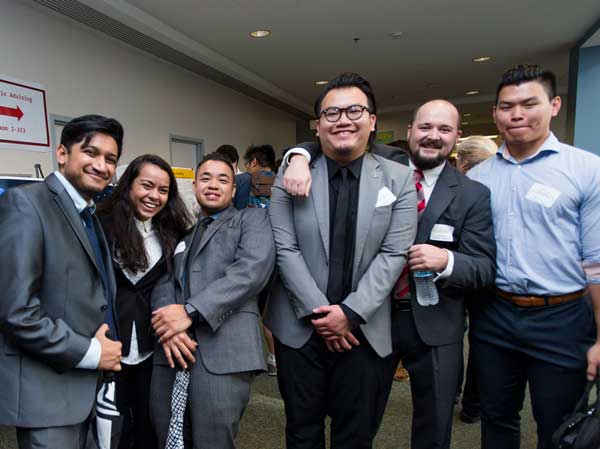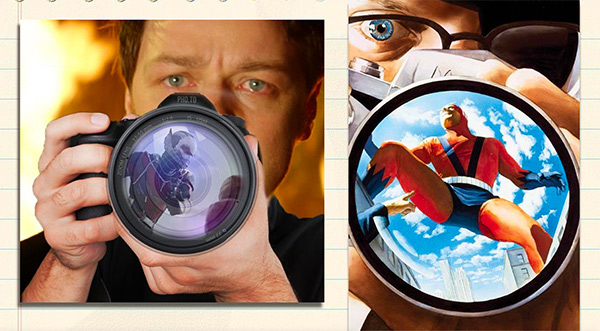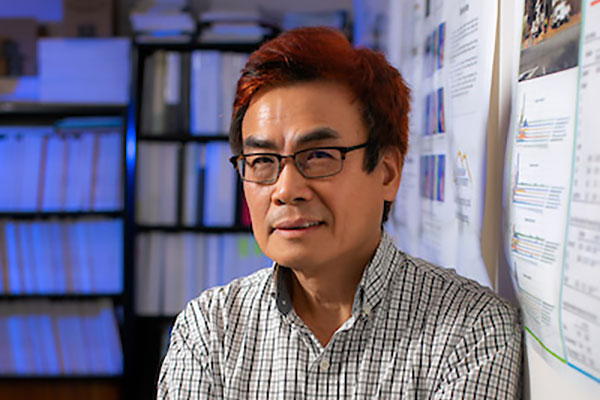
Moon Dust
MARIETTA, Ga. | Feb 3, 2020

Later, the lights cut out as a comet trail ripped across the area where the dancers previously stood. The lights returned and revealed an empty stage as if the comet appeared out of thin air. The magical effect was the result of a collaboration between Kennesaw State’s College of the Arts (COTA) and the College of Computing and Software Engineering (CCSE).
“Moon Dust,” choreographed by COTA dean Ivan Pulinkala, unveiled last week to a sold-out crowd, metaphorically explores the journey of soulmates through life into an afterlife, with the help of visually stunning effects created by CCSE virtual reality developer Jaylin Gillam and a team of student assistants. The first-time collaboration between the two Colleges, “Moon Dust” serves as a demonstration of the creativity that can be achieved when students work across disciplines, Pulinkala said.

Appearing seamless after extensive rehearsals by the dancers and tweaking by the programmers, Gillam said the early stages of the production presented a steep learning curve. In a sense, he said, there was a language barrier between the worlds of dance and computing.
“At first, I didn’t know a lot of technical terms that were being used since I lacked a background in performance, but Dr. Pulikala took time to carefully explain his vision for the project and the inspiration he drew from the source material,” Gillam said. “At that time, we weren’t sure what the music would be, but we spent a lot of time discussing potential visuals and began bouncing ideas off one another.”
For months, Pulinkala would introduce Gillam and his team to music paired with the performance, challenging them to create visuals they felt matched the tone. The team would, in turn, create images they felt captured the emotion of the dancers and then share with Pulinkala for his input.
“I welcome the disruptive innovation that occurs when another collaborator is invited into the choreographic process,” said Pulinkala, who approached CCSE to discuss the opportunity. “The contributions made by Jaylin and the team from CCSE added a dimension to ‘Moon Dust’ that make the visuals and movement co-communicators of my choreographic intent. ‘Moon Dust’ gives audiences a unique aesthetic experience and showcases the opportunities KSU students have to grow from interdisciplinary collaborations on campus.”
Alyssa “AJ” Myers, a dance and information technology double major who took part in “Moon Dust,” said the combination of performing at the Marietta Dance Theater surrounded by on-stage graphics was appealing. Having shown interest in both dance and computing at an early age, she noted that the production combined two of her own passions.
“The most difficult thing about this dance production is being perfect, because you’re working with computer graphics on the stage,” she said. “That’s where the challenge is.”

“I’ve done illustrations for smaller game jams and other projects before, but never for a production on this level,” he said. “To see something at this scale was amazing, even if it was just 30 seconds of a moon.”
College of Computing and Software Engineering Dean Jon Preston said that “Moon Dust” is an excellent example of the interdisciplinary opportunities at KSU.
“Creativity spans all disciplines, and this dance production shows what we can accomplish when we work with others who come to a project with different perspectives,” said Preston.
Written by Travis Highfield
Photography by David Caselli


















